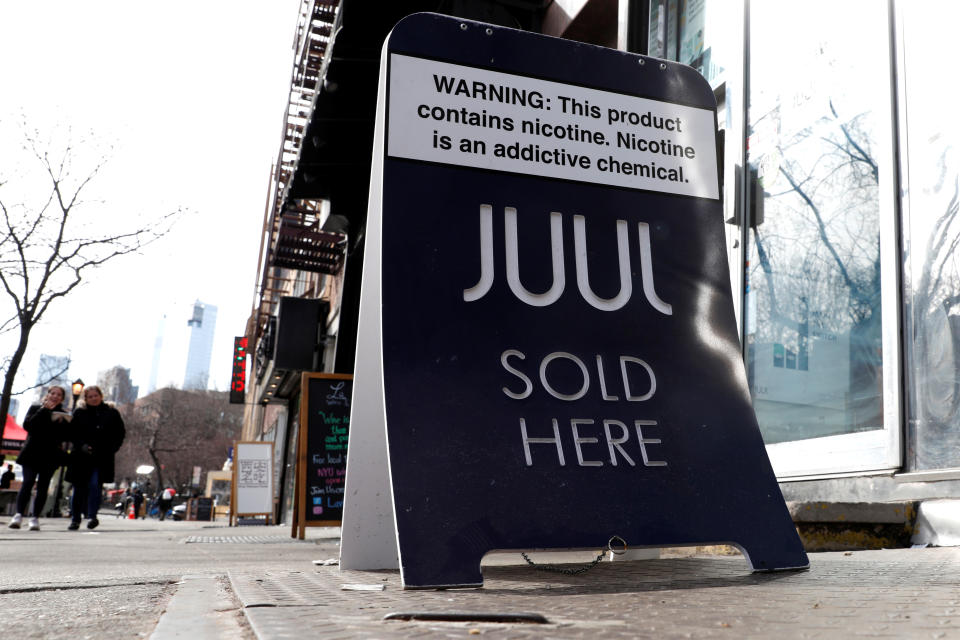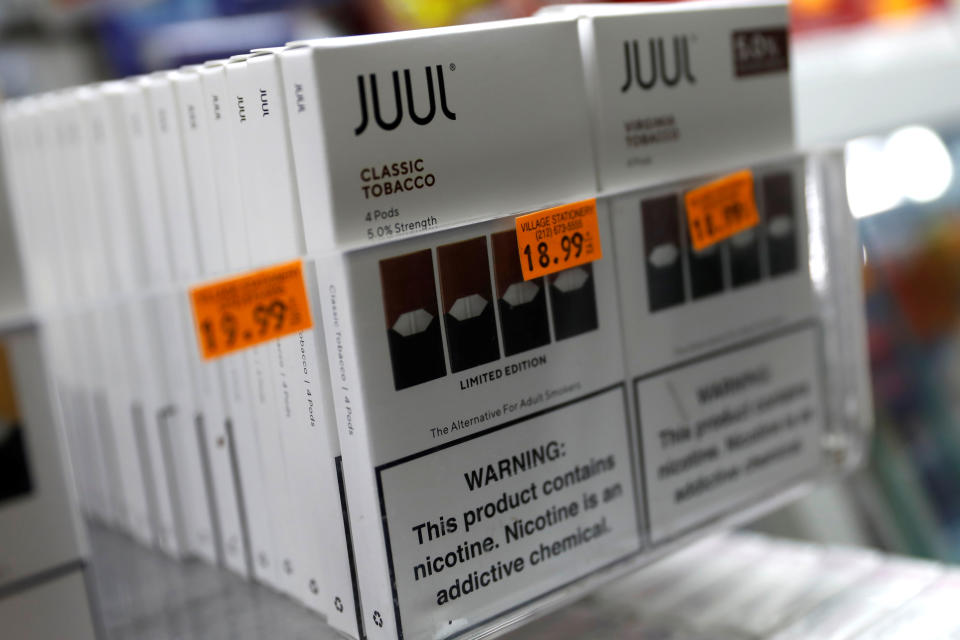'JUUL has ignored the law' and the FDA wants answers
The Food and Drug Administration (FDA) is chastising vape giant Juul for claiming that its products were safer than cigarettes as well as the company’s general marketing practices.
The FDA took particular offense at Juul for claiming that its products — e-cigarettes — were “99% safer than cigarettes.”
“Regardless of where products like e-cigarettes fall on the continuum of tobacco product risk, the law is clear that, before marketing tobacco products for reduced risk, companies must demonstrate with scientific evidence that their specific product does in fact pose less risk or is less harmful,” Acting FDA Commissioner Ned Sharpless stated. “JUUL has ignored the law, and very concerningly, has made some of these statements in school to our nation’s youth.”

The “law” refers to the requirement the FDA has laid out for companies, that before they market a product as less harmful than cigarettes, they need the agency’s approval. Juul hasn’t submitted its products for review.
“In addition,” Sharpless added, “we’re troubled about several issues related to JUUL’s outreach and marketing practices that came to light in a recent Congressional hearing. We will continue to scrutinize tobacco product marketing and take action as appropriate to ensure that the public is not misled into believing a certain product has been proven less risky or less harmful.”
Yahoo Finance previously reported that Juul’s ads bore an uncanny similarity to those pushed out by Big Tobacco in previous decades.
The FDA is “finally stepping up and calling out at least one of the e-cigarette companies,” Dr. Joshua Mansour, an oncologist in Los Angeles, told Yahoo Finance. “I know that there are several of them, not just Juul, but it's a step moving forward towards getting a little bit of regulation behind the whole situation.”

Juul has 15 days to respond
The federal agency sent a warning letter to Juul on September 9 and referenced statements raised during Congressional testimony which were made previously by a Juul representative to school students.
A Juul rep had previously stated: “FDA was about to come out and say it [JUUL] was 99% safer than cigarettes… and that …would happen very soon.”
The FDA said it requested that JUUL provide a written response within 15 working days “describing its corrective actions and its plan for maintaining compliance with the Federal Food, Drug, and Cosmetic Act (FD&C Act), including its plan to prevent the same or similar violations.”
Failure to do so, it warned, “may result in the FDA initiating further action, including, but not limited to, civil money penalties, seizure, and/or injunction.”
Additionally, the FDA said it was concerned with statements and representations made that “may convey that switching to JUUL is a safer alternative to cigarettes, in that using JUUL products poses less risk or is less harmful than cigarettes.”

Negative effects of vaping reported across the country
Negative health effects are increasingly being reported across the country.
In June this year, an e-cigarette exploded in a 17-year-old boy’s face in Nevada, and he was left with a bloody mouth, broken teeth, and a hole in his jaw.
In August, doctors in Wisconsin confirmed 12 new cases of lung disease due to vaping, the Milwaukee Journal Sentinel reported. 13 other cases were under investigation.
This week, a patient in Colorado told a doctor: “I have been vaping a ton past 2 weeks and every time I do I have chest tightness.”
vape lung case in CO 7-30-19 33 yo M recognized 1st by rad Dr. Alex McKenzie. pt said to ER doc "I have been vaping a ton past 2 weeks and every time I do I have chest tightness." path = lipid laden macrophages. @radiology_rsna @RadiologyChicks pic.twitter.com/rZgmg1NJx9
— Jennifer Kemp, MD (@JenniferKempMD) September 7, 2019
Yet people continue to vape, which worries Dr. Mansour.
“There is still a lot of uncertainty that we don't know and people thinking that it is safe may lead to very harmful consequences down the line,” he explained. “And we're already seeing several hospitalizations all across the country, not just in one area, from kids that are requiring innovations and need a ventilation support in order to breed from having started using the second such a young age.”
He noted that the misconception with Juul began with the fact that it was considered safer because it was a nicotine product.
“A lot of people believe: 'Oh, well this smoke that I'm inhaling doesn't have many of the carcinogens that the standard cigarettes or tobacco products do have,’” Dr. Mansour said. “They're thinking that nicotine itself doesn't have many harmful effects, but even a small amount, we can see several side effects from nicotine.”
This misunderstanding could turn fatal, he warned.
“I'm an oncologist by trade. And for certain procedures I do, we require that patients not be smoking for a certain amount of time. For example, we do a bone marrow transplant, we say that because of the chemotherapy ... even if they come in for something unrelated to different type of cancer, you can't smoke for this amount of time,” Dr. Mansour explained. And yet, “what many patients will come and say to me, they'll say, ‘Oh, well, I'm not smoking cigarettes, I'm just using this, e-cigarette Instead.’”
That doesn’t work because smoking e-cigarettes becomes “another factor that can still deteriorate, the lining of the muscles of the lungs make it more difficult to breathe, make it harder to recover,” he explained.

Bacteria found in some e-cigarettes
And on top of nicotine, there were other substances to worry about, Dr. Mansour added.
A recent study by the Harvard T.H. Chan School for Public Health found that popular e-cigarettes products sold in the U.S. were actually contaminated with bacterial and fungal toxins.
The study, which examined 75 e-cigarette products — and not necessarily Juul — found that 27% of them “contained traces of endotoxin, a microbial agent found on gram-negative bacteria,” and 81% “contained traces of glucan, which is found in the cell walls of most fungi.”
This was bad, they added: “Exposure to these microbial toxins has been associated with myriad health problems in humans, including asthma, reduced lung function, and inflammation.”
“A lot of people don't know that side of things as well,” said Dr. Mansour. “So not only are you inhaling smoke, not only are you being exposed to nicotine, but there's also potential that they're being microbes and other toxins in there that can lead to respiratory problems in itself.”

Teen e-cigarette usage across the U.S.
A separate report by Sunrise House, an American Addiction Centers treatment facility based in New Jersey, found that the highest rate of e-cigarette use was found in Wyoming.
Using 2017 data from the Centers for Disease Control, which estimated the percentage of high school-aged youth who currently use electronic cigarette devices, the researchers noted that while the national rate of use is 13.2%, the state with the highest rate was Wyoming at 29.6%. Colorado (26.2%) and Hawaii (25.5%) follow close behind.
States with the lowest rates were Utah (7.6%), Ohio (8.6%), and Iowa (9.0%).
—
Aarthi is a writer for Yahoo Finance. Follow her on Twitter @aarthiswami.
Read more:
Juul's CEO and a Stanford researcher, under oath, disagree on a crucial conversation
Juul exposed: How Big Vape took a page from Big Tobacco’s old ad playbook
E-cigs are twice as effective as nicotine replacement at helping smokers quit, study shows
Read the latest financial and business news from Yahoo Finance
Follow Yahoo Finance on Twitter, Facebook, Instagram, Flipboard, SmartNews, LinkedIn, YouTube, and reddit.
